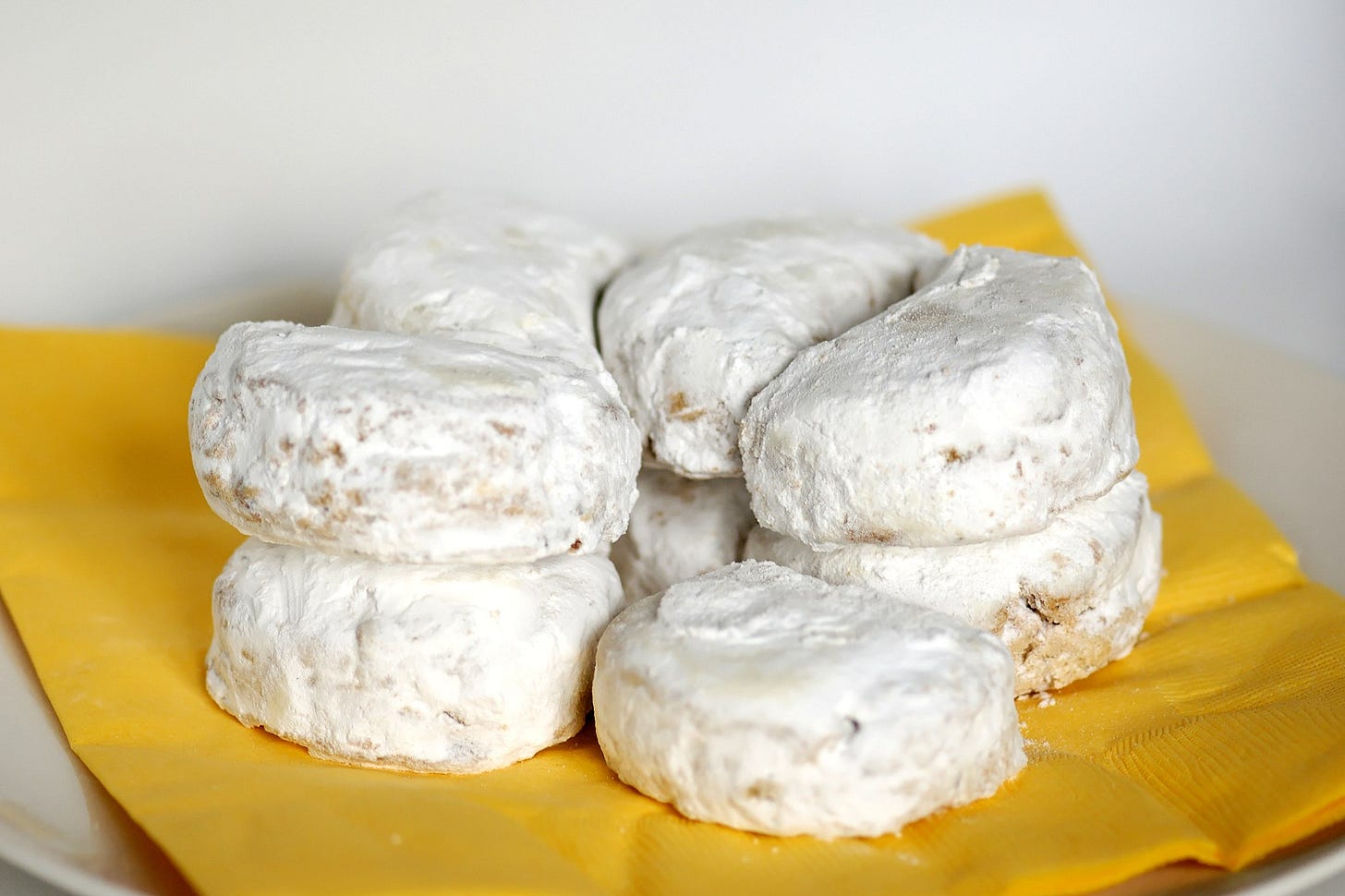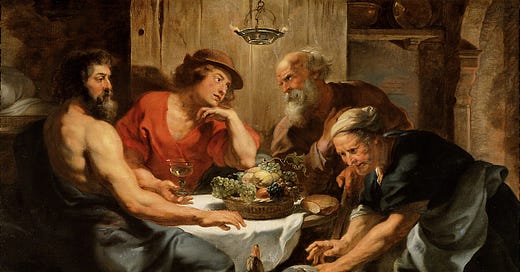Athens has long been one of our favorite cities in the world. After Paris, it’s the European metropolis we’ve lived in the longest and it is certainly the one that continues to capture our hearts. If one can get past its dilapidated sidewalks, its perilous crosswalks overrun with homicidal taxi drivers (I’ve almost been overrun about a hundred times), its endless rows of seemingly drab polikatoikias with their tiered balconies and thick canvas awnings flapping in the wind, or its poorly maintained waste management system, Athens has a charm that is incomparable.
All one needs to fall in love with Athens is to experience, even once, the dazzling sight of the ancient Acropolis being gradually illuminated at dusk as one sits leisurely beneath a palm tree on the terrace of a taverna with a cold glass of crisp assyrtiko in one hand and a forkful of perfectly-battered kalamari doused with a squeeze of fresh lemon in the other.
But it’s not only the arresting ancient architecture, the inimitable food and wine, and the perennially cynical but exuberantly playful charm of the Greek people that keep us coming back year after year, it’s also the xenia. Perhaps the best way to describe xenia is for me to hand the baton over to my Greek better half, Ryan Elston:
Xenia is a Greek word representing the sacred relationship between a host and a guest. The opposite of xenophobia, xenia is about respect and reciprocity – the duty of a host to care for their guests, even if they are strangers, as well as the duty of the guest to respect their host. It is an ethical responsibility that has been taken very seriously in Greek culture since ancient times, and can be seen in both The Iliad and The Odyssey all the way down to the restaurants, tavernas and shopkeepers of today.
There’s a Greek myth that embodies the concept of xenia: The story of Baucis and Philemon. In fact, it’s the very first myth I remember my Greek grandmother reading to me as a child. Baucis and Philemon were an elderly little couple who lived in a humble cottage in the woods. One day two strangers appeared at their door, and Baucis and Philemon invited them into their home. Though they were very poor and had little to serve their guests, the little old man and the little old woman scrambled about their cottage, serving the strangers all of their remaining food and wine to show their hospitality, their xenia. The strangers were of course two gods in disguise, Zeus and Hermes no less, who had previously been refused at every door. So as a reward for their xenia, Zeus and Hermes told the little old couple that they would grant them any wish they desired. Baucis and Philemon whispered together for a few moments and then told the Gods, “We have only one wish – that neither one of us shall outlive the other.”
Their wish was granted and the humble cottage was turned into a beautiful temple. The little old couple became the high priest and the high priestess. And after a long and happy life, instead of dying, the couple were transformed into two regal trees that grew around one another in a spiral, two trees and two souls forever entwined. As a couple of 22 years, this has always been one of our favorite Greek myths.

In December 2019, we flew from Paris to Athens to ring in the New Year and celebrate our 20th anniversary (on January 2nd) in style, dining out for a week in our divine Greek mecca. That New Year’s Eve we spent at Materia Prima, without a doubt one of the city’s finest wine bars. Owner Michalis (who goes by Mike) is a friend of ours, and we go there as often as we can when we’re staying in Athens. Not only has he created a wine list with over 40 exceptional wines (with a focus on natural wines from independent Greek producers of every region), he also boasts one of the finest wine cellars in the city. And Mike is only too happy to let you walk into Materia Prima’s private cellar and peruse his collection of over 800 vintage wines from all over the world, available to consume in the restaurant or to take home. Not only are the wines at Materia Prima fantastic, the small plates created by the extremely talented chefs of their intimate kitchen are phenomenal. We merrily clinked champagne flutes with Chef Dora and Mike, drinking natural bubbly from the Peloponnese paired with pâté de foie gras and a mosaic of Hellenic cheeses. It was a night to remember! Little did we know what 2020 had in store for us . . .
The word for wine in Greek is krasí (pronounced krah SEE) and one of the things that always excites me when we’re staying in Athens is visiting all my favorite local wine shops and restaurants in Koukaki, one of our most beloved areas of the city. Koukaki is a hip, non-touristy neighborhood full of fantastic restaurants and wine shops offering a plethora of Dionysian libations. This may be the reason that practically every time we stay in Athens, we rent an apartment in either Koukaki or the neighboring Neos Kosmos. Or it could just be that we’ve been staying there for so many years that it always feels like home. We know the shopkeepers, the deli owners, the butchers and all the wine shops in the neighborhood. Or maybe it’s the xenia!
One such wine shop is En Fiali Wine and Spirits on Veikou street near the Syngrou Fix metro station. It’s run by George and his assistant Maria, both of whom speak English fluently. However, even though we’ve been frequenting their shop for so many years, George only speaks to me in Greek at this point. I’m pretty sure he assumes I should have at least a modicum of Greek under my belt by now. And I do! If anything can motivate me to learn another language, it’s being able to purchase my wine!
I go there regularly when we’re in Athens to stock our apartment with their malagouzia, assyrtiko, xinomavro and agiorgitiko. The wines all come directly from small producers in bulk, and they sell them for three to four euros in plastic liter bottles (you get a discount if you bring them back to be replenished!) that they fill from barrels or boxes. Greek wines have definitely been largely overlooked in the international marketplace. Not only are they extremely affordable, they’re easy on the palate and very food-friendly. The malagouzia at En Fiali is a wonderful white aperitif wine with great acid and a slightly honeyed aftertaste that makes it a perfect pairing with some taramasalata, tzatziki or white anchovies marinated in olive oil. Their assyrtiko, which hails from the idyllic island of Santorini, is a heartier wine with a great citrus edge that makes it ideal with fried kalamari, fried smelts or grilled octopus over a chickpea purée.

For reds, their xinomavro from Naousa can’t be beat for the price of four euros. It’s a lush, tannic wine bursting with fruit, balanced by good acidity. This is the wine I want with pork gyros or keftedes arni (lamb meatballs). Last but not least is their agiorgitiko from the Nemea region. With its low acidity and spicy notes of nutmeg, plum and forest floor, it’s a perfect companion to spanakopita, gigantes plaki or roasted chicken with Greek potatoes.
Our other favorite haunt in Koukaki is Pantopolion, a gastronomical treasure owned and operated by two friends, Giannis and Stavros, one of whom is routinely sitting behind his computer at the counter with a sign in front him that says “Bossy.” With a selection of artisanal products from all over Greece, there is nothing in the store that hasn’t been curated to offer you the best of what the country has to offer. Be it slices of beautifully cured pastourma, red pistachios from the Peloponnese or their homemade pita, this place is pure gold. We almost always go there for their 1.5 litter plastic bottles of retsina (this one has delicate piney notes and soft round fruit) and their house white and red (also in 1.5 liter plastic bottles), but we inevitably end up leaving with a tub of kourabiedes (almond butter cookies in powdered sugar), a dozen of their mouthwatering, house-made dolmades and a half kilo of perfectly spiced tirokafteri.

As 2021 came to a close, we found ourselves back in Athens after two years of living in the Balkans during the pandemic (Serbia, Kosovo, Albania and Croatia). It was a brisk winter night in Athens so we decided to celebrate in the comfort of our cozy 7th-floor apartment with an unobstructed view of the Acropolis. We had made the rounds to all of our wine shops and delicatessens and butchers and cheese mongers, and now had before us a beautiful spread of meze that I had prepared for our evening’s festivities. I’d made my lamb keftedes, a Greek salad with sheep’s feta and heirloom tomatoes, my garlic-heavy tzatziki with creamy, full-fat Greek yogurt and my signature Greek potatoes.
From Pantopolion we had purchased white anchovies marinated in herbs and oil, fresh pita and their incredible aforementioned dolmades. We’d also gotten a giant wedge of the very precious manoura cheese from Sifnos (sadly not available outside of Greece) as well as some Greek-style cannoli stuffed with pistachio cream for dessert. From another local wine shop in Neos Kosmos, Kava, we splurged for some actual bottles of wine and bubbly (no plastic liters this time): Taralas Winery’s Aphrodite Sparkling Xinomavro (the first sparkling red wine of Greece), a few of bottles of delightful malagouzia and a small bottle of mastika to accompany our dessert.
Our New Year’s Eve started with some Lizzo, ouzo and tzatziki on the balcony. As midnight rolled around, champagne flutes of sparkling Aphrodite in hand, we clinked glasses to a better New Year. And then, in unison with all the other revelers on their balconies, we cheered “Kali Chronia!” [Happy New Year!] as the fireworks exploded above Athena’s majestic temple!





Greece has always been a bucket list place of mine and this article definitely helps fuel that desire! What I would give to be having spanakopita and keftedes IN Greece right now. Also, tzatiki all day every day!!! Thanks for sharing the beautiful story demonstrating Xenia & Eternal Love. Congrats on 25 years together R & R 🥂⚘️❣️
You have brought back a wonderful memory of sitting in a Greek restaurant and gazing at the illuminated Acropolis while enjoying a traditional Greek dinner.